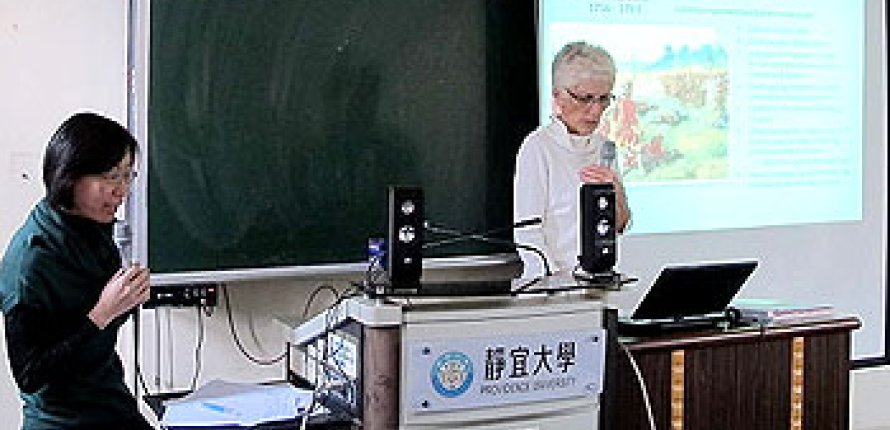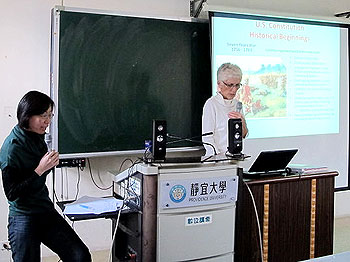Fulbright Scholar Story - Nancy Fioritto Patete

 My journey to Providence University in March 2012 began with Dr. Ming Hung, a retired professor and native Taiwanese, from Kent State University, Ohio, where I teach as an adjunct instructor. Dr. Hung’s recommendation to Providence’s President “Augustine” ChuanYi Tang that I might lecture there was immediately seized and acted upon. I was asked to give a series of lectures in both American law and literature, noting that I have degrees and experience in both disciplines. I prepared eight power point presentations for lectures that were to last about two hours each and in English. How, I wondered, would students make it that long at a single sitting and in a language that is not their own?
My journey to Providence University in March 2012 began with Dr. Ming Hung, a retired professor and native Taiwanese, from Kent State University, Ohio, where I teach as an adjunct instructor. Dr. Hung’s recommendation to Providence’s President “Augustine” ChuanYi Tang that I might lecture there was immediately seized and acted upon. I was asked to give a series of lectures in both American law and literature, noting that I have degrees and experience in both disciplines. I prepared eight power point presentations for lectures that were to last about two hours each and in English. How, I wondered, would students make it that long at a single sitting and in a language that is not their own?
I spoke to literature classes about the development of early American literature, literature that grew out of America’s “westward expansion,” the writings of the expatriates in Paris, and the literary diversity in America today. Law students wanted to know about America’s governing system of ”checks and balances” and our complicated way of power-sharing between the federal and state governments. Students found it helpful to hear American literature read aloud in vernacular by an American. Law students were able to compare systems of governments and requirements for becoming lawyers in both countries.
Upon my arrival I was given a welcoming reception and provided an office where I could hold one-on-one conferences. Providence University has Roman Catholic beginnings but the community includes Buddhist, Taoist and various Christian denominations. Its mission comprises service in love, mercy and justice in an education designed to be holistic. This was truly felt. I roomed at the University’s convent on the campus, where I enjoyed breakfast and casual conversation with the sisters. Campus cafeteria meals were consciously fresh and healthy and, enjoyed by the students. On more than one occasion I ordered carry-out noodle soup to take back to the convent with me. On most evenings, however, I dined at restaurants in the company of faculty or administration.
My stay was not confined to the campus in Taichung. I toured the National Palace Museum in Taipei, home of some of China’s most valued art treasures. I visited not a few Buddhist temples, several of which are located in the spectacular Taroko Gorge National Park in Hualien.
Mine was a cross-cultural experience of many profound dimensions. Even with a population of 21 million people, Taiwan has a culture of hospitality and industriousness. It is orderly and, for this reason, doesn’t feel crowded. The food is superb and its people are proud of the cuisine. The commitment toward environmental awareness is obvious in the open-space cleanliness and restorative projects evident everywhere. Education is valued. I came away impressed with students who, even though shy to speak out, demonstrated a curiosity to learn and a remarkable ability to listen and respond to my lengthy lectures. The willingness of Providence to work in tandem with Fulbright was there, as was the energy to carry out the program. This is an experience for which I will be forever grateful.
